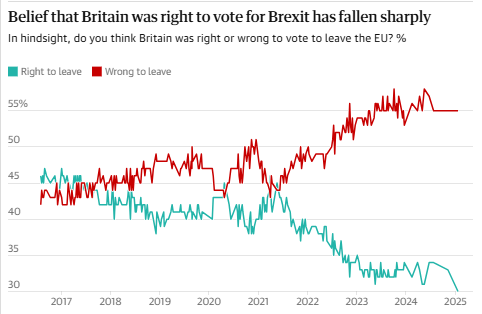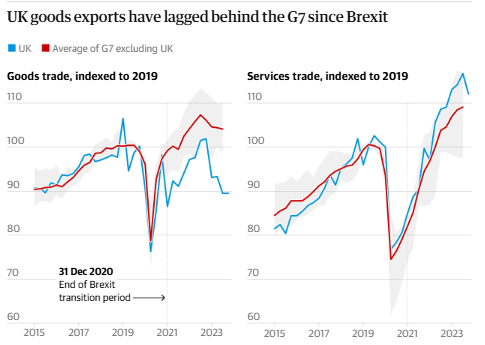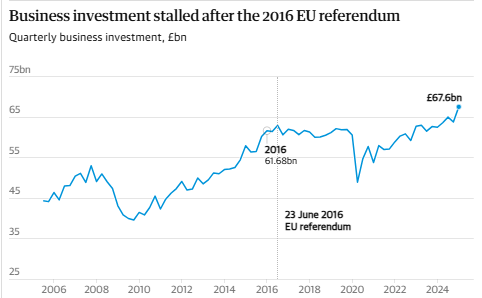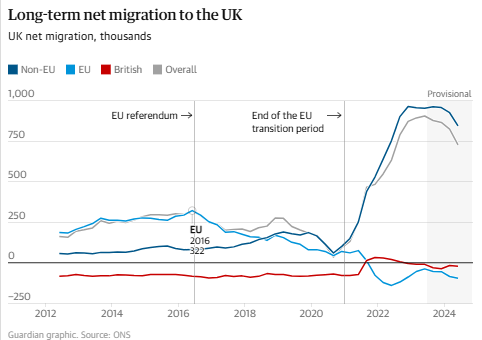How has Britain’s economy done since Brexit? Five charts to explain the UK-EU meeting
Almost 10 years after the Brexit vote, there are still problems to fix at a meeting on Monday hosted by Keir Starmer.
Keir Starmer will lead the first UK-EU meeting since Brexit on Monday. The government wants to improve the relationship with the EU, Britain’s biggest trading partner, to help the economy.
It has been nearly 10 years since the Brexit vote, and five years since Britain officially left the EU. There are clear economic problems to solve. Many people, whether they voted to leave or stay, are unhappy with the Brexit deal made by Boris Johnson’s government.
Here are five charts that show the economic situation before the meeting.
Support for closer ties
Since the 2016 vote where 52% chose to leave the EU, fewer people now support Brexit. A recent YouGov poll showed only 30% of Britons think leaving the EU was right, while 55% think it was wrong. Most people want closer ties with the EU.
Over 60% say Brexit has gone badly, including about a third of those who voted to leave. Most believe Brexit has hurt the economy, trade, and made living costs higher.

Economic effects of Brexit
It is hard to see the full impact of Brexit because other big events happened too, like Covid-19, the war in Ukraine, and changes in global trade. Before the vote, some experts said Brexit would be a disaster, while others said it would help Britain become more global. The truth is in the middle. But there is growing proof Brexit has harmed the economy.
The Office for Budget Responsibility (OBR), which forecasts government finances, says the UK will lose about 15% of trade and 4% of national income in the long run because of Brexit.

Trade problems
Brexit created new trade barriers, which hurt British goods exports. But these barriers could be reduced by new talks, with some give and take. The EU is the UK’s biggest trading partner. In 2024, UK exports to the EU were worth £358 billion (41% of all exports), and imports from the EU were £454 billion (51% of all imports).
Since the Brexit transition ended at the end of 2020, UK goods exports have grown much slower than other rich countries in the G7. In 2024, exports of goods to the EU were 18% lower than in 2019, when adjusted for inflation.
However, exports of services — an area where the UK is very strong — have done better. The OBR says this is because the Brexit deal made it harder to trade goods than services, and the UK depends less on the EU for services exports than for goods.
Small businesses hit hardest
Small businesses have struggled the most with the extra paperwork and rules after Brexit. HMRC says the number of customs forms needed has more than quadrupled, costing businesses an extra £7.5 billion each year.
Business uncertainty
After the unexpected Brexit vote, the government didn’t have a clear plan. Years of arguments over what Brexit should mean caused confusion and delays. As a result, many businesses paused their investment plans.
With no clear idea of what the UK’s future relationship with the EU would be, business investment stalled. This added to already low spending on tools, buildings, and infrastructure, partly because the government was cutting public spending.

The National Institute of Economic and Social Research (Niesr) says business investment in 2023 was 13% lower than it would have been if the UK had stayed in the EU. By 2035, they expect the gap to shrink to 8%, but this still means a GDP loss of 5–6% – about £2,300 per person.
Migration has increased
Despite promises to reduce immigration after Brexit, net migration to the UK hit a record high of nearly 1 million in the year to June 2023.
Reasons include the war in Ukraine, changes in the immigration system after Brexit, and more people coming to study after Covid restrictions were lifted.

Nearly 90% of new arrivals are from outside the EU. Migration from EU countries has dropped, causing worker shortages in sectors like construction, hospitality, and manufacturing.
A small step forward?
Labour says it wants better ties with the EU but won’t undo key parts of Brexit. It has ruled out rejoining the EU single market, customs union, or freedom of movement, so any new deal will be limited.
James Smith from the Resolution Foundation says deals on defence, fishing, youth mobility, and food standards could help the economy a little. But he also said the bigger benefits are off the table because of these limits.
John Springford from the Centre for European Reform estimates that any reset in relations with the EU might increase the UK’s GDP by just 0.3% to 0.7% – much less than the 4% GDP loss expected from Brexit.
Still, economists say improving ties with the EU is important, especially with global uncertainty rising, including a possible trade war if Donald Trump returns.
Stephen Millard from Niesr said a better trade deal with the EU would be more helpful than ones with countries like India or the US. He added that even small steps toward closer EU ties could help the economy and public finances.
Published: 19th May 2025
For more article like this please follow our social media Twitter, Linkedin & Instagram
Also Read:
Scotland uses more water due to heavy industry and rainfall
UK economy grows faster than expected – feel hopeful?
FTSE 100 Forecast: What to Expect in Q3 2025























